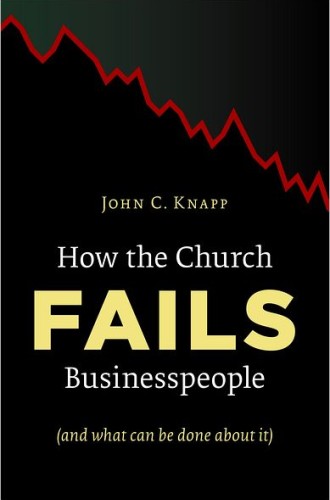How the Church Fails Businesspeople (and What Can Be Done About It), by John C. Knapp
In business we are often confronted with situations that are not simple black-and-white issues of justice, in which we must discern not what is the single right thing to do but what is the most right thing to do.
In How the Church Fails Businesspeople, John Knapp tells the story of Alan, a businessperson who is facing a slowdown in his business and is therefore running short of cash. At the same time, a client is having difficulty in paying his bill, the payment of which would significantly improve Alan’s cash flow. Several months earlier, Alan talked with this client, who asked for more time to pay his bill. Alan relented at that time, but now with his own cash-flow issues, he is ready to call his attorney to begin legal action.
At the last minute, Alan is struck with the tensions between the financial, legal and spiritual implications of this decision. He calls his pastor to arrange a meeting, hoping his pastor’s advice will help him sort these tensions. When they meet, however, the pastor gives him a less than helpful response. He simply asserts that “business is business” and advises Alan to put his own interests first.
Read our latest issue or browse back issues.
For Knapp, this case study highlights the great divide between work and faith. Businesspeople are often discouraged from bringing their faith into the business world. At the same time, the world of the church is oblivious to the business world and the challenges that businesspeople face. This great divide leads to fragmentation in people’s spiritual lives.
Alan’s is a true story. It came out of a research study that Knapp and some seminary students conducted with 230 people across a variety of occupations, denominations and demographic criteria. Respondents were asked to identify a particular episode in their work life in which they had confronted an ethical issue. The study yielded two important conclusions. First, “Christians across a broad spectrum of occupations had little difficulty recalling ethical challenges encountered in their work lives.” Second, “an overwhelming majority report that the church had done little or nothing to equip them for faithful living at work.” They observed that clergy seem to be preoccupied with weddings, funerals and private issues in life, and not with the public or occupation-related issues that consume most Christians’ workweeks.
Knapp asks: “How would things be different if believers at work learned to tap the wellspring of Christian wisdom?” To answer this question, he begins by laying out the contributions that the worlds of business and the church both make toward the fragmentation of people’s faith/work connection. The business world and business education encourage a moral relativism that claims that matters of faith are unwelcome or even irrelevant in the boardroom. At the same time churches, and specifically clergy, lack a true understanding of the complexities of the business world and as a result are reluctant to draw connections to it in the pulpit or to provide business-related counsel.
Next Knapp discusses the need to rethink our understanding of vocation and to develop a moral theology of work. He suggests that “Christians are seldom encouraged to think of ‘secular’ work as truly important to God.” On the contrary, he contends, each of us has both a primary and a secondary calling. We are all first called to follow Christ and second to do so in a particular context.
This is consistent with what my church espoused when I was growing up. Anabaptist theology teaches that all are ordained, as part of our personal commitment in baptism, to the prime task of sharing the good news of Jesus Christ. Adult baptism, in my tradition, bestows on each member the power to minister. In practice, however, we often end up blessing or ordaining only those going on to perform service for the church. This sends a message to the rest of the members that their calling is secondary and that as a result they are not as accountable for building God’s kingdom.
Knapp suggests that the fundamental problem here is the church’s definition of Christian vocation. “God grants us freedom,” he says, “to explore and develop ourselves, and much of this activity occurs through work. This essential point is too often missing from church teachings on vocation.” I have often said, sometimes to raised eyebrows, that as an employer I have as much influence on people’s spiritual lives as my pastor does—or more. Work is the primary locus in life for many people. I have seen lives change dramatically as people meet challenges and trials at work.
The church is missing out on a significant missional opportunity. As Knapp says, “Too often the church portrays itself as a place of refuge rather than a spiritual gymnasium to strengthen Christians for the transformative work they must do in the world.” Equipping members for ministry in their workplaces may become the preeminent role of the future church community. This would be a very different church from the one my parents and grandparents attended, where the main focus of ministry and the recipient of resources from its members was the local congregation. But a church that is attentive to the workplace is more in tune with the realities of and opportunities for kingdom building today.
“The moral terrain of our work lives,” Knapp says, “is mostly defined by law and economics rather than theology, leaving us with an uninspired ethical pragmatism lacking in wisdom and heart.” So he proposes a moral theology for work that focuses on Micah 6:8, and specifically on acting with justice, kindness and humility so unconditional love becomes relevant in the workplace.
Knapp’s suggested theology resonates strongly with what I experience daily at work. He argues that it is “possible for an ethic of love to undergird the Christian’s life and witness in today’s workplace.” I observe so much woundedness in our workplaces, and so many people’s lives lack unconditional love. Herein lies a great opportunity for organizational leaders to develop a workplace culture that promotes healthy structures and relationships.
I do wish that Knapp’s invocation of unconditional love went a bit further. We can’t love others when we don’t have sufficient love for ourselves. When I have leaders in my organization who believe they are unconditionally loved, employees experience higher levels of work satisfaction and productivity than when I have someone in a leadership position who doubts being unconditionally loved. I find this a truism for leaders in all organizational types, including church institutions. Those of us who are entrusted with selecting organizational leaders must place this condition on an equal level with competence if we are to have organizations that realize Knapp’s dream of “equipping Christians for vigorous discipleship in public life.”
According to Knapp, if things are to change within the institutional church, a basic reformulation is needed of the type of leadership that pastors provide. Churches will need to escape the sacred/secular and private/public dualities and acquire a different set of skills, including collaborative leadership, courageous conversation and more inclusive storytelling. Knapp asks, “How different might our understanding of discipleship be if the church’s narrative told of bankers, bakers, teachers, and truckers—the living body of Christ in action?” He proclaims, “Equipping Christians for vigorous discipleship in public life may be the church’s best hope for bringing the gospel to a world desperately in need of God’s love.”
This book pushed me beyond my previous understanding of the role I can play in my church and business communities. It challenges both businesspeople and pastors to redefine what it means to be relevant to a new generation of church members longing for deeper integration between their professional and spiritual realms.







